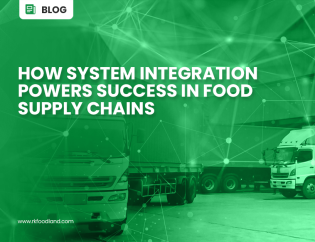
[Avg Read Time – 6mins.]
With 2024 around the corner, supply chain leaders are poised to face a new era marked by pivotal trends shaping the future of the industry. After a thorough review of numerous articles from trusted sources, we have distilled the trends that SCM professionals and Food Sector CXOs must watch for, in the coming year. These insights are not just predictions; they are the signposts for future success. By understanding these trends, you will be equipped to make informed decisions that can strengthen your operations against uncertainties and evolving market demands.
Stay with us as we unpack these trends, offering you the clarity to lead with confidence in the year ahead.
1. Application of AI/ML
AI and ML are revolutionizing SCM with on-demand, accurate insights for smarter decision-making. By 2024, these technologies are set to become indispensable for their ability to process big data, leading to accurate forecasting and streamlined supply chains. The surge in their adoption is fuelled by democratization of knowledge & skills around Generative AI and rapid development in conversational style Application Programming Interface (APIs).
Relevance to Indian Food Supply Chain:
AI/ML will accelerate demand forecasting & improve accuracy, reducing overstock and understock scenarios, directly affecting waste reduction and service levels.
2. Sustainability (Diversity & Inclusion)
Sustainability in SCM is evolving to include not just environmental responsibility but also diversity and inclusion within operations. By 2024, D&I will be critical for fostering innovation, resilience, and competitive advantage. The trend is gaining traction as businesses recognize that diverse supply chains drive better decision-making and reflect a broader customer base. Technological advancements are enabling companies to implement D&I initiatives more effectively, tracking progress and ensuring accountability.
Relevance to Indian Food Supply Chain:
Emphasizing diversity & inclusion will not only enhance ethical sourcing and social equity but also resonate with a customer base that values social responsibility, potentially improving market share.
3. Inventory Challenges
The drive towards hyper-personalization is intensifying inventory challenges. By 2024, the expectation for products will strain traditional inventory models, which are not designed for the variability and complexity that customization demands. This trend is intensifying as consumer preferences shift towards more personalized goods, requiring supply chains to manage a wider variety of stock-keeping units (SKUs) and shorter product life cycles. The challenge will be to balance the cost-efficiency of mass production with the need for personalized offerings, without inflating inventory costs or compromising on delivery times.
Relevance to Indian Food Supply Chain:
Food supply chains will need to adapt to hyper-personalization trends, requiring to manage a wider variety of SKUs & inventory to cater to niche market demands.
4. Agility and Resilience in Operations
Agility and resilience are becoming the twin pillars of supply chain excellence as businesses prepare for an unpredictable future. By 2024, the ability to rapidly adapt and recover from disruptions will define SCM leaders. This trend is accelerating as companies experience the tangible benefits of flexible, responsive supply chains—especially in the face of unforeseen global events. Investments in technologies that enable quick pivoting and robust risk management practices are key drivers of this trend.
Relevance to Indian Food Supply Chain:
With agile and resilient supply chain operations Food businesses can adapt to supply shocks, demand variability and market volatility, maintaining continuous product availability.
5. Accelerated Digital Transformation
The rapid digitization has led to development of many industry or process specific APIs. By 2024, the integration of cutting-edge digital supply chain solutions will be critical, with cloud computing, IoT, and advanced analytics leading the charge. This trend is picking up speed now as companies seek to gain visibility, enhance connectivity, and automate processes in an increasingly complex supply chain landscape. The acceleration is also a response to the need for resilience against disruptions and the drive for cost-effective scalability.
Relevance to Indian Food Supply Chain:
Digitalization will streamline the value chain, from procurement to delivery, enhancing visibility, traceability, and service delivery assurance.
6. Surge in Talent with Digitization Skills
As supply chains experience a digital transformation, the need for professionals skilled in emerging technologies will surge. This trend is intensified by the swift progression of digitization and rapid developments in generative AI, necessitating ongoing skill enhancement. The forthcoming year promises abundant opportunities for individuals possessing not only technical expertise but also strategic & analytical capabilities essential for harnessing these technologies effectively. To meet this demand, proactive investment in professional development and education will be crucial.
Relevance to Indian Food Supply Chain:
The skills gap in supply chain could limit Food Service & FMCG sectors’ ability to implement new technologies and processes, impacting efficiency.
7. Circular Supply Chains
By 2024, sustainability will be deeply embedded in SCM, with a significant pivot towards green operations and circular supply chains. This trend is gaining ground as businesses recognize the long-term value in resource conservation and closed-loop systems. The urgency is propelled by a combination of technological advancements that enable efficient recycling and upcycling, and a regulatory environment increasingly favouring sustainable practices. The circular supply chain model is not just an environmental response; it is a strategic approach to reduce waste, recover value, and drive innovation in product life cycles.
Relevance to Indian Food Supply Chain:
Integrating green operations and circular supply chain models will help Food businesses mitigate environmental risks, capitalize on consumer trends towards sustainability, securing long-term operational viability.
8. Strategic Investments
Strategic investments in supply chain partnerships are becoming increasingly critical as companies seek to enhance their competitiveness and resilience. By 2024, forming alliances with key partners will be essential to access new technologies, markets, and capabilities. The challenge lies in selecting the right partners and managing these relationships effectively, ensuring alignment of goals, and sharing of risks and rewards. Investments must be strategic, focusing on long-term value creation rather than short-term cost savings.
Relevance to Indian Food Supply Chain:
Strategic supply chain investments will lead to stronger partnerships in the Food Service & FMCG sectors, fostering collaboration that can drive down costs and improve market responsiveness.
9. ‘Total System Cost’ approach
As we approach 2024, supply chains are set to embrace transformative strategies in response to intensifying cost pressures from rising fuel, energy, labour, and real estate prices. The ‘Total System Cost’ approach, encouraging a holistic view of the supply chain costs rather than in isolated segments will be widely adopted. This forward-thinking strategy includes implementation of comprehensive cost management frameworks that allow for looking beyond the immediate impact of costs, considering long-term value creation, and systemic efficiency. It emphasizes the integration of cross-functional data analytics to drive decision-making, the adoption of sustainable practices that lead to cost savings, and the strategic use of automation to enhance productivity and reduce reliance on fluctuating labour markets.
Relevance to Indian Food Supply Chain:
Rising costs in SCM will necessitate more efficient operations and innovative cost-saving strategies in the Food Service & FMCG sectors to preserve margins and competitive pricing.
10. Cyber Security Measures
As supply chain becomes increasingly digital, cyber security measures are moving from the server room to the boardroom. By 2024, robust cyber security frameworks, including data encryption, blockchain technology, and stringent policy enforcement, will be non-negotiable for safeguarding supply chain data integrity and continuity. The urgency for these measures is escalating as supply chains face growing cyber threats and data breaches. The integration of blockchain is particularly noteworthy for its potential to create transparent, tamper-proof records, enhancing trust across the supply chain.
Relevance to Indian Food Supply Chain:
Enhanced cybersecurity will protect the integrity of data & digital assets across the supply chain, ensuring the Food Service & FMCG sectors’ compliance with regulations and customer trust.
As we look towards 2024, the terrain of supply chain management is evolving rapidly, presenting a spectrum of trends that will shape the future of our businesses. Armed with insights into these potential shifts, now is the moment to sharpen our focus and align our growth strategies accordingly. Let us embrace this period of change as an avenue for advancement and collaboration. Partner with us to navigate these trends with agility and foresight. Together, we can accelerate our collective growth journey, outpace the competition, and contribute positively to the broader ecosystem. The time is now to turn knowledge into action and possibilities into realities.
Partner with us to enhance your supply chain to these dynamic trends
Reference Links:









